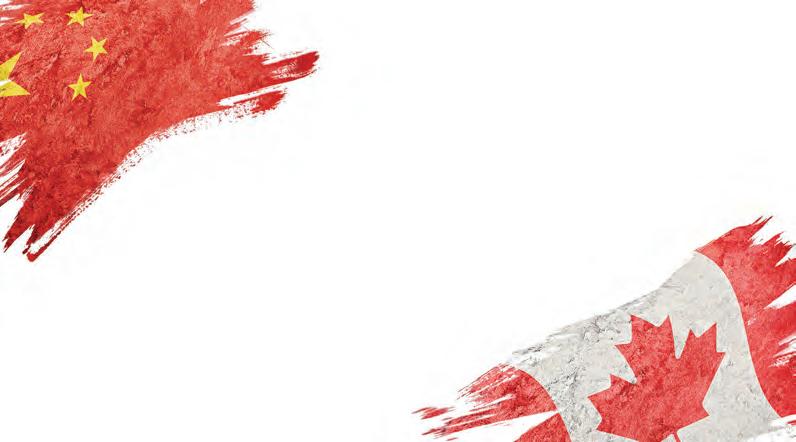
3 minute read
TR ADE Global tensions, relationships and the pandemic have cut into doing business with Canada’s number two trading partner
the scope of Buy American policies.
The association asserted in a statement at the time the Canadian government must respond in kind with its own reciprocal policy.
CME was adamant to ask for those provisions, Darby says. At the federal level, for example, Canada has an exemption to Buy
NAFTA PROS
Since 1994, NAFTA has generated economic growth and rising standards of living for the people of all three member countries.
In 2017, total trilateral merchandise trade (of each country’s imports from one another) reached nearly US$1.1 trillion.
Total merchandise trade between Canada and the United States has more than doubled since 1993, and has grown more than nine-fold between Canada and Mexico. Source: Government of Canada
TRADE
American policies for military projects. But to be fair, he offers, “it’s not entirely one way. We have local content requirements as well.” He cites Buy Canadian projects in Quebec and Ontario, which offset some of the loss.
Reciprocity is not the best action to take, he says. “We would prefer no difference between a A view of the Decast yard from the air. PHOTO: DECAST Canadian supplier or an American one.” agreement, it’s not a shining agreement. But
Despite global free trade, such protecwe need a modern manufacturing agreement tionist policies also exist in Europe. “We’ll because 79% of all we produce in Canada we continue to work against them,” Darby says. sell to the United States. We need rules that “Once things are back to normal we will are fair.” work with the US and Mexico to clarify things.” He added dumping is often a factor Kim Laudrum is a Collingwood, Ont.-based of export subsidies or currency manipulabusiness writer and regular contributor to tion. “It’s hard to tell why it’s going on and PLANT. E-mail klaudrum@rogers.com. enforcement is very difficult. We’re pleased CUSMA has been ratified. Versus the old Comments? E-mail jterrett@plant.ca.
Tension with CHINA

CANADIAN BUSINESSES ARE FEELING IT
CCBC survey reveals a decline in trade based on three key factors. C hina is Canada’s second largest two-way trading partner but business took a hit in 2019 and will likely be down this year, according to a Canada China Business Council (CCBC) survey.
The 2019-2020 Business Impact Survey, conducted in partnership with the Rotman Institute for International Business and fielded Feb. 20 to March 14, examines the impact of bilateral tensions between March 2019 and March 2020.
The results are based on 282 responses from mostly Canadian businesses operating in China (87%) and Chinese businesses operating in Canada (13%). Manufacturers represent 7.6% of the respondents.
The survey reveals business was good at $103 billion for the year until December 2018, when the RCMP arrested Huawei CFO Meng Wanzhou over alleged bank and wire fraud in violation of American sanctions on Iran. What followed were various trade actions against Canadian interests, and the apparent retaliatory arrests of two Canadians in China: Michael Spavor and Michael Kovrig.
Business is down since December 2018.
IMAGE: ALLEXXANDARX - STOCK.ADOBE.COM
More disruption followed when the US initiated a trade war with China and the year closed at about $98 billion in two-way business. The COVID-19 pandemic was in its early phase when the survey was taken, so its full impact is yet to be determined.
Not surprisingly, 43% of respondents reported business was down following a record year in 2018, while 22% reported an increase and 34% said business was stable.
The outlook remained positive for most: 43% were optimistic about the future of Canada-China business, although growing uncertainty has prompted 33% to make China a lower priority in their global plans, with 5% exploring opportunities in other countries.
Most manufacturers (52%) expected business to be stable, 19% looked to increased business and 29% expected a decline. More than two thirds of companies (69%) didn’t see any change in priority doing trade with China, 25% said it was a lower priority and 6% cited trade as a higher priority.
Tension has led 63% of respondents to postpone business development trips or negotiations, twice 2018’s level. And 51% said contracts or deals postponed, 40% reported cancellations and 46% said demand had decreased, about twice the 2018 rate.
Download results at https://ccbc.com.









